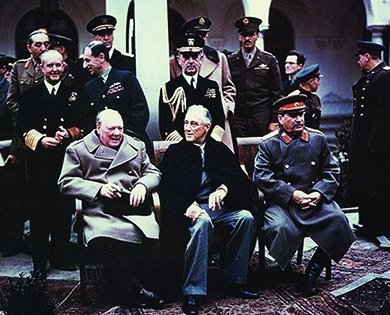| << Chapter < Page | Chapter >> Page > |
Listen to the accounts of Holocaust survivors by clicking on “Listen Now” below the name of the person whose story you wish to hear.
The last time the Big Three met was in early February 1945 at Yalta in the Soviet Union. Roosevelt was sick, and Stalin’s armies were pushing the German army back towards Berlin from the east. Churchill and Roosevelt thus had to accept a number of compromises that strengthened Stalin’s position in eastern Europe. In particular, they agreed to allow the Communist government installed by the Soviet Union in Poland to remain in power until free elections took place. For his part, Stalin reaffirmed his commitment, first voiced at Tehran, to enter the war against Japan following the surrender of Germany ( [link] ). He also agreed that the Soviet Union would participate in the United Nations, a new peacekeeping body intended to replace the League of Nations. The Big Three left Yalta with many details remaining unclear, planning to finalize plans for the treatment of Germany and the shape of postwar Europe at a later conference. However, Roosevelt did not live to attend the next meeting. He died on April 12, 1945, and Harry S. Truman became president.

By April 1945, Soviet forces had reached Berlin, and both the U.S. and British Allies were pushing up against Germany’s last defenses in the western part of the nation. Hitler committed suicide on April 30, 1945. On May 8, 1945, Germany surrendered. The war in Europe was over, and the Allies and liberated regions celebrated the end of the long ordeal. Germany was thoroughly defeated; its industries and cities were badly damaged.
The victorious Allies set about determining what to do to rebuild Europe at the Potsdam Summit Conference in July 1945. Attending the conference were Stalin, Truman, and Churchill, now the outgoing prime minister, as well as the new British prime minister, Clement Atlee. Plans to divide Germany and Austria, and their capital cities, into four zones—to be occupied by the British, French, Americans, and Soviets—a subject discussed at Yalta, were finalized. In addition, the Allies agreed to dismantle Germany’s heavy industry in order to make it impossible for the country to produce more armaments.
Upon entering the war, President Roosevelt believed that the greatest threat to the long-term survival of democracy and freedom would be a German victory. Hence, he entered into an alliance with British prime minister Winston Churchill and Soviet premier Joseph Stalin to defeat the common enemy while also seeking to lay the foundation for a peaceful postwar world in which the United States would play a major and permanent role. Appeasement and nonintervention had been proven to be shortsighted and tragic policies that failed to provide security and peace either for the United States or for the world.
With the aid of the British, the United States invaded North Africa and from there invaded Europe by way of Italy. However, the cross-channel invasion of Europe through France that Stalin had long called for did not come until 1944, by which time the Soviets had turned the tide of battle in eastern Europe. The liberation of Hitler’s concentration camps forced Allied nations to confront the grisly horrors that had been taking place as the war unfolded. The Big Three met for one last time in February 1945, at Yalta, where Churchill and Roosevelt agreed to several conditions that strengthened Stalin’s position. They planned to finalize their plans at a later conference, but Roosevelt died two months later.

Notification Switch
Would you like to follow the 'U.s. history' conversation and receive update notifications?